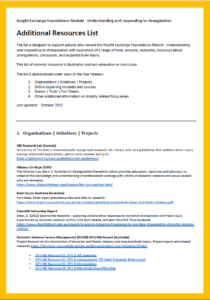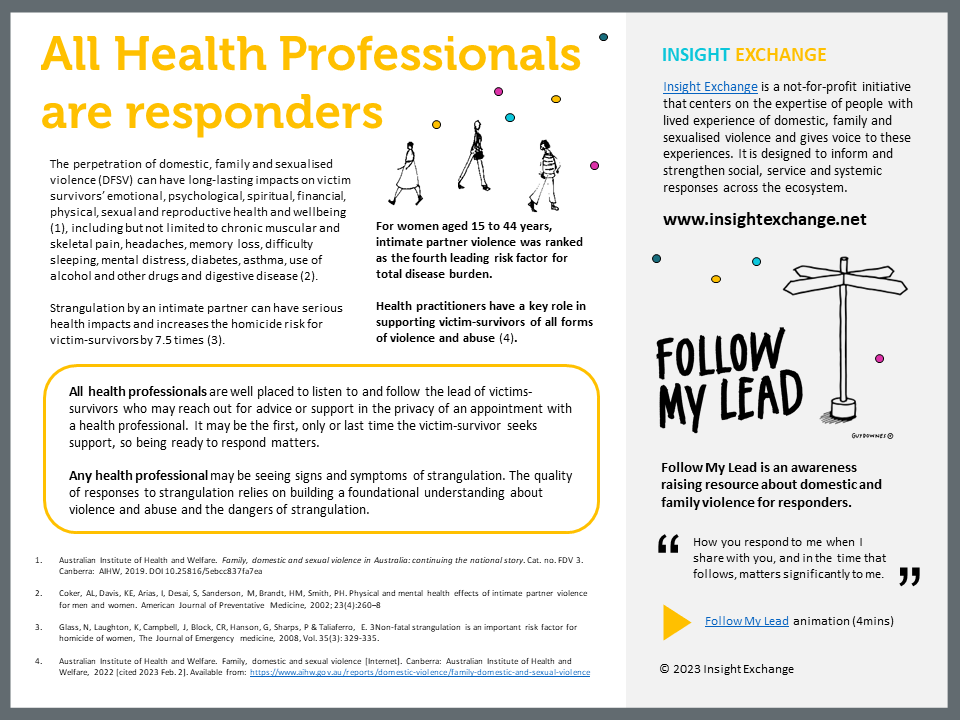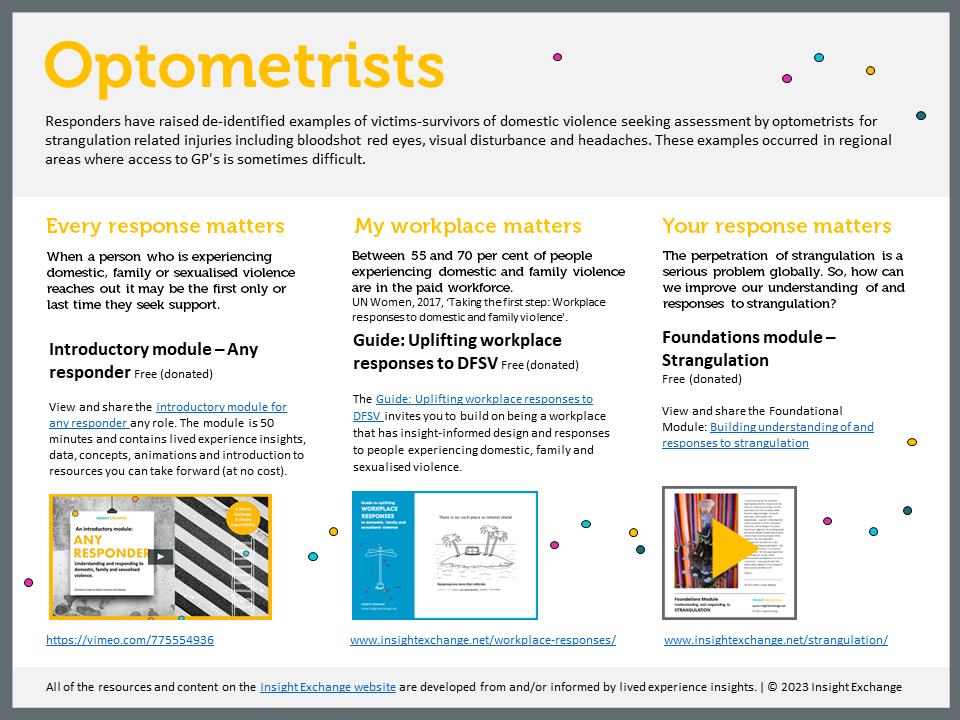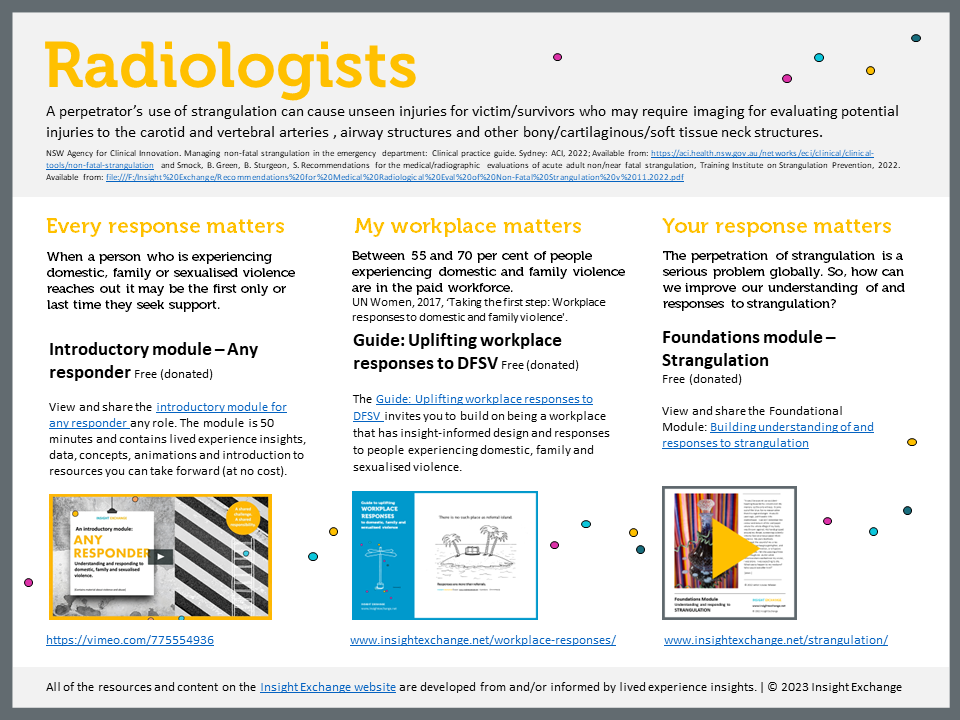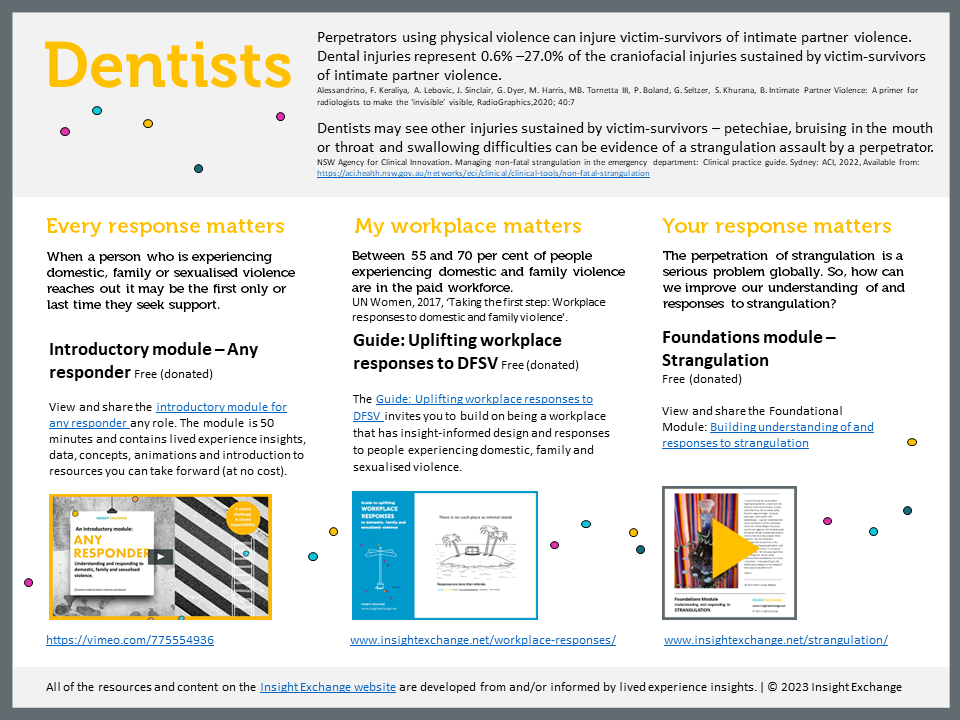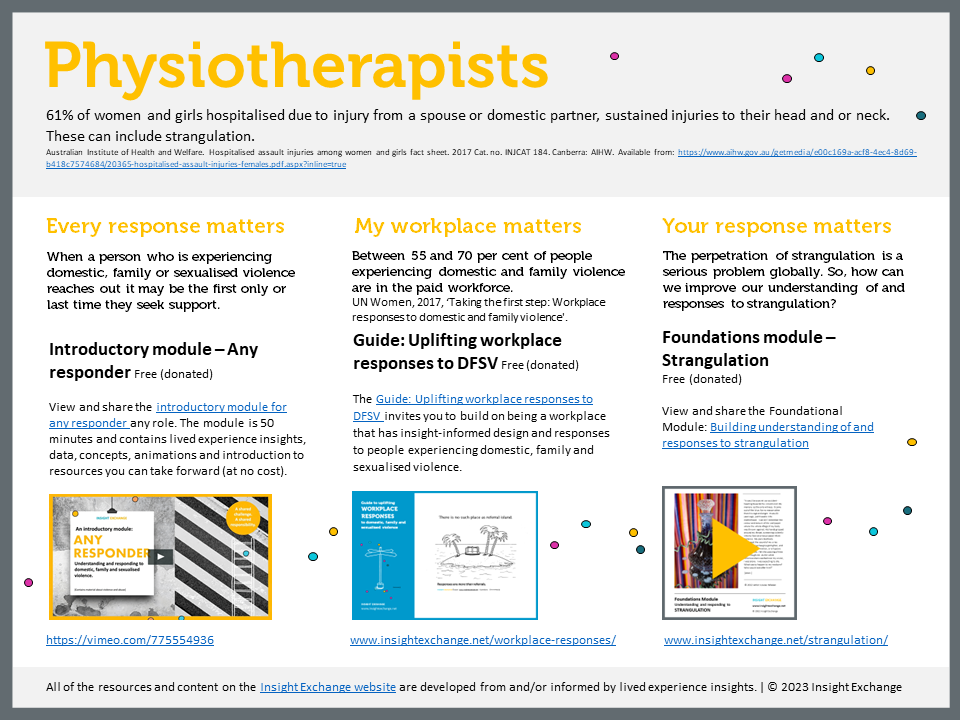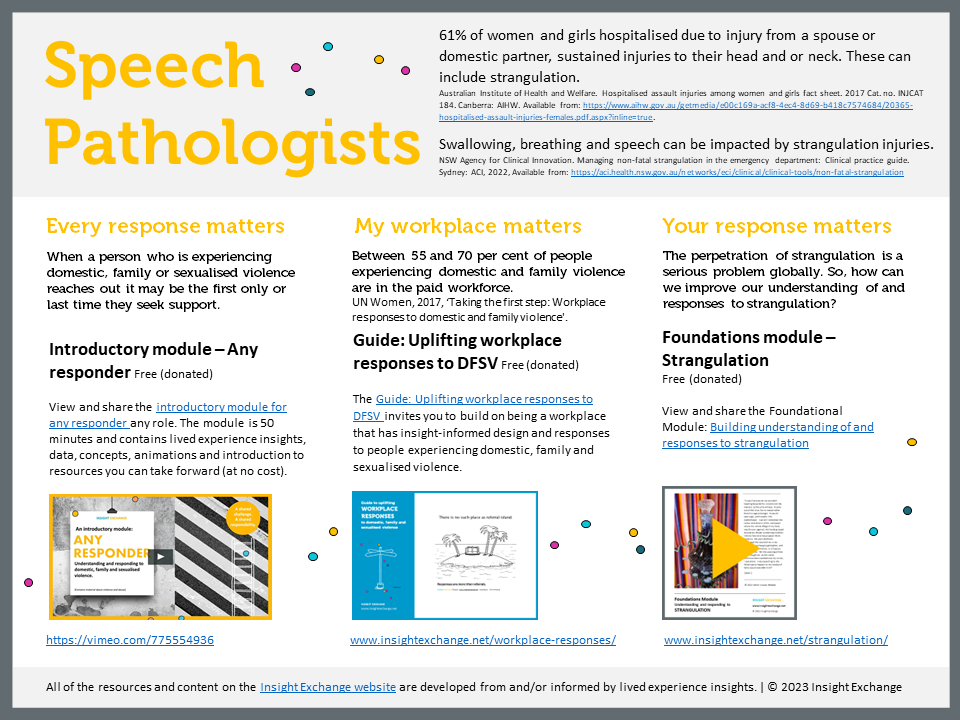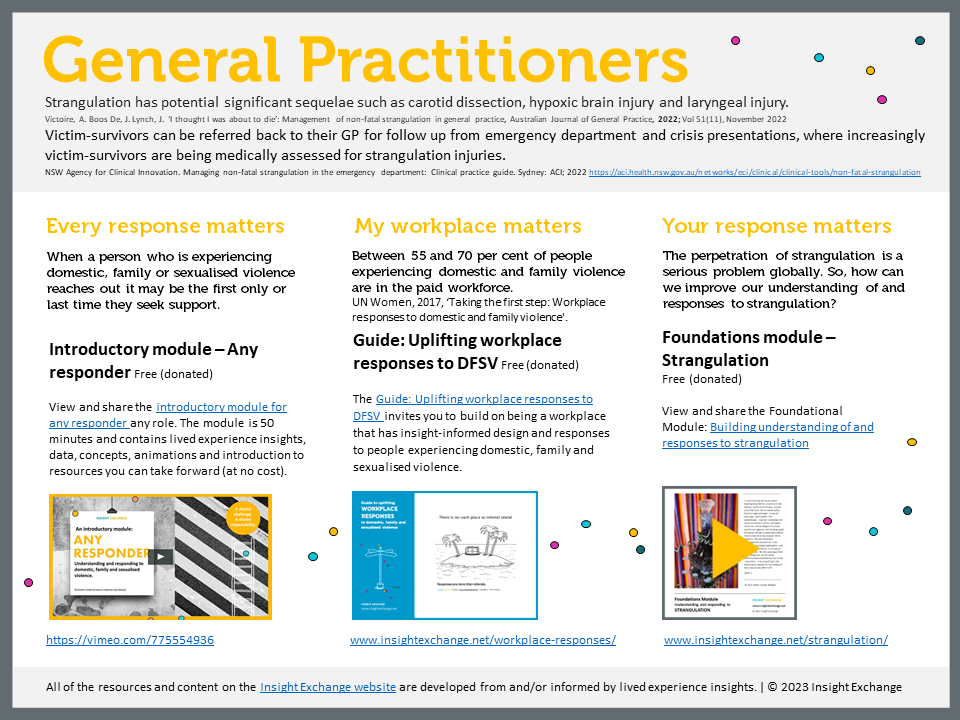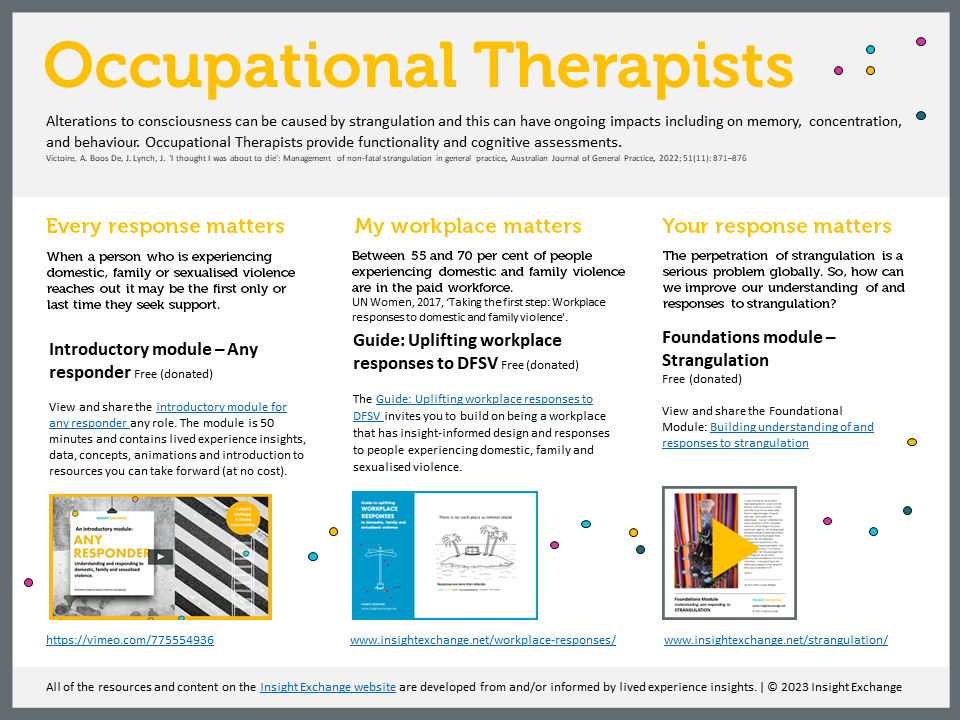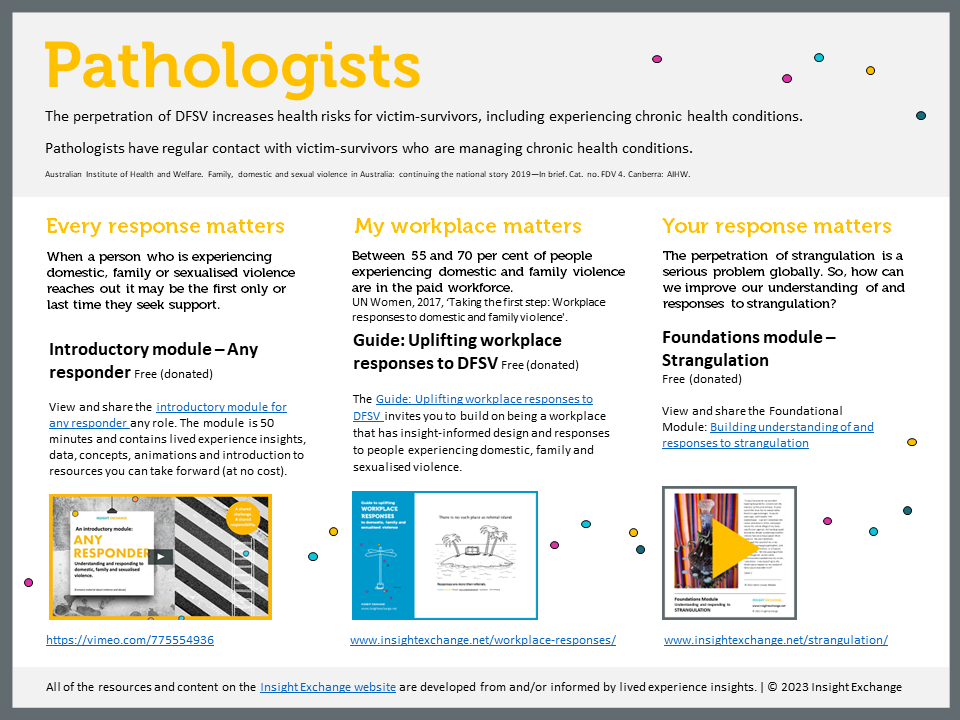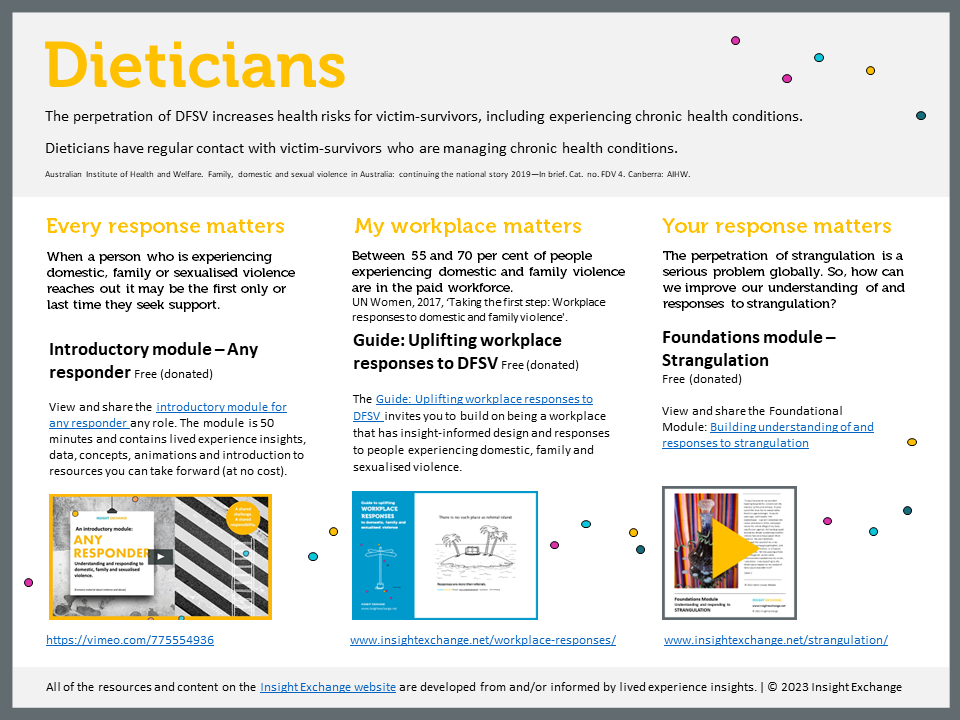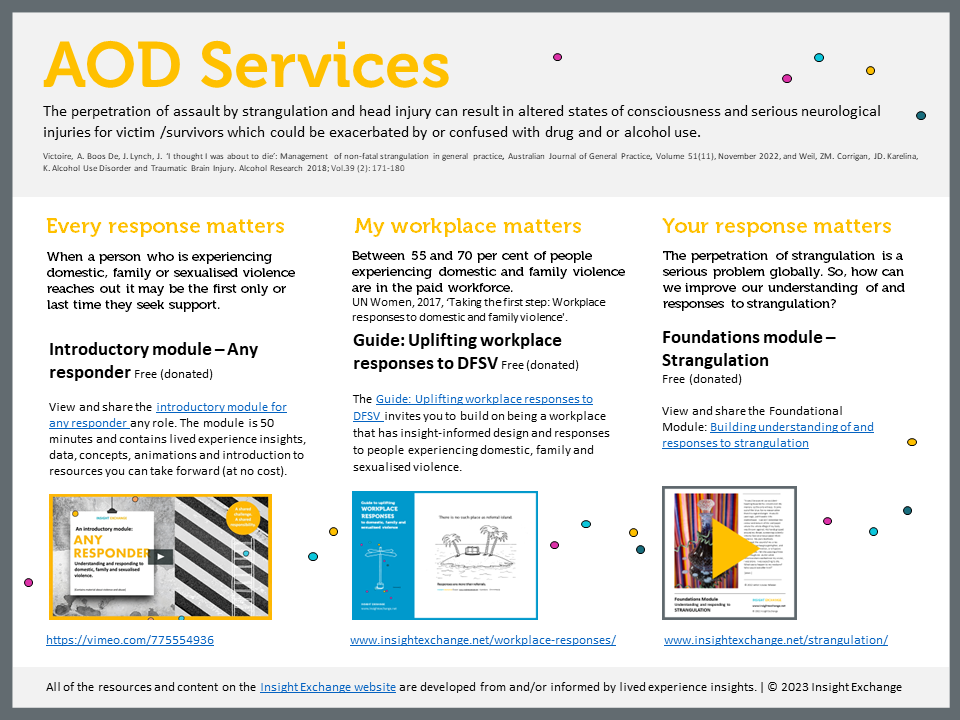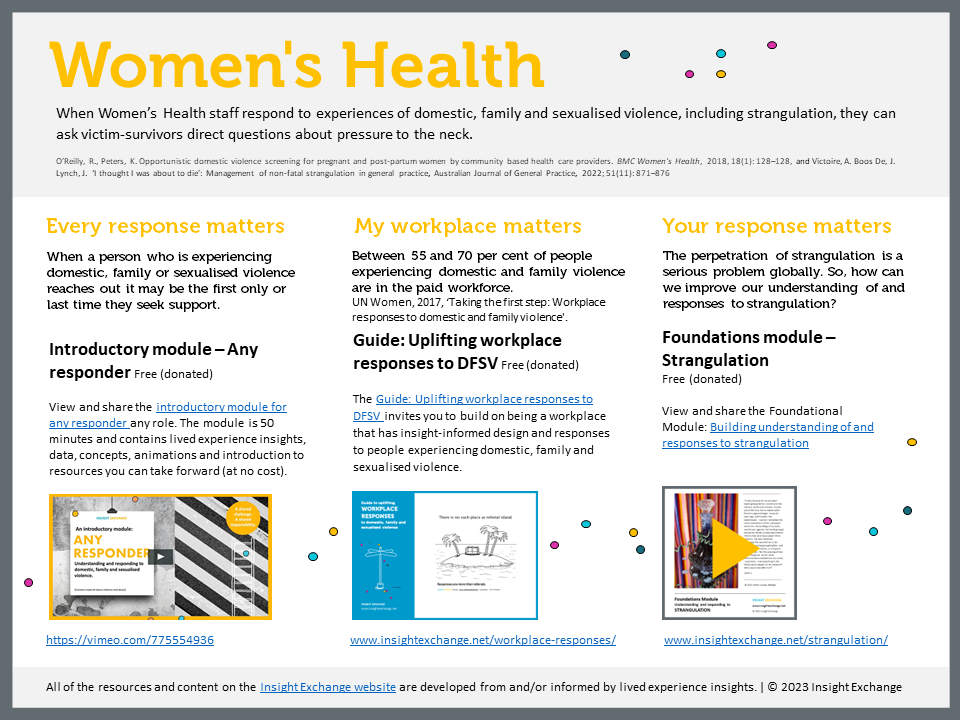In focus: strangulation
The perpetration of strangulation is a serious problem globally. So, how can we improve our understanding of and responses to strangulation?
We invite you to build on your understanding and responses through these free (donated) resources (animation, module, artworks) below. Please follow the guidance on Using Insight Exchange.
Animation: View/share/embed the short animation (5mins) about the dangers of strangulation.
This animation contains descriptions of and resistance and responses to violence and abuse. The end of animation refers to two reflection resources: My Safety Kit and My Dignity
"Seeing the animation gave me the knowledge and confidence to ask the questions about strangulation." [VANS Social Worker]
Module: Building understanding of and responses to strangulation (includes Auslan sign-language)
This module contains descriptions of and resistance and responses to violence and abuse. The module refers to two reflection resources: My Safety Kit and My Dignity
References: Open the list of references used in the module.
Responses/Feedback: Share with us your de-identified response/feedback to the module.

The Arts Lab collection of five original artworks by collaborating artist Louise Whelan feature in the Foundations Module - Understanding and responding to strangulation. The anonymous voice of a persons lived experience of strangulation is presented in text across the collection. Click on the button (above) to open the collection in a lightbox.
Arts Lab Strangulation Collection | Artworks © Louise Whelan. These artworks were developed with Insight Exchange and each image is protected by copyright. To use images permission must be sought from Insight Exchange – Apply here.
Book a free team session (virtual)
Team bookings welcome from Australia, Aotearoa New Zealand and Canada
To support team responses, the foundational module (Strangulation) is being shared in a 90min virtual session.
This time-limited opportunity is being donated to support the understanding of responders.
Teams can make use of this opportunity and these resources to talk together about building on social, service and system responses to strangulation.
Team Bookings for 2024 are now open. Specify your preferred date and time in the booking form.
After completing the team booking form you will receive:
- confirmation of your booking date & time
- a ready-to-share invite in PDF that you can use to invite your team & a link to access the session
- a ready-to-share follow up flyer (PDF) for attendees, containing information and reflection resources
If you have questions about the session, please contact the Insight Exchange team on ([email protected])
Team virtual session structure: 90 mins
- 60mins view the digital module
- 30mins Q&A with Insight Exchange Associate Danielle Allen.

Danielle was awarded a Winston Churchill Fellowship to explore collaborative responses to victims of interpersonal violence who have experienced non-fatal strangulation and traumatic brain injury in the USA and Canada. Read the report here Churchill Fellowship project and report.
Summary of bookings and responses
Read the running record of team bookings into the virtual sessions. Examples of feedback:
- “This was excellent. I learnt a lot of useful knowledge about how to respond and better understand this issue. I was thinking about the workshop for days and thinking of ways I could help share my learnings.”
- "The presentation is very informative, and I greatly appreciate the use of victim survivors' voices and experiences."
- "I thought it was fabulous, very easy to understand and to stay focused. I loved that it covered the Foundations as well."
- "Fantastic presentation- brilliant at locating responsibility, acknowledging resistance of victim survivors and using appropriate language."
- "A confronting but equally informative session. It gives more understanding about language used in relation to strangulation."
Summaries (Nov 2022 - June 2023)
Booking summaries
- Read Booking Summary (Australia)
- Read Booking Summary (New Zealand)
- Read Booking Summary (Canada)
Reflections and insights from participants who viewed the module
Read participants key insights and reflections about what they will start, keep and stop doing in response to the module, and who they wish had access to the resources.
- Read 'My Key Insight'
- Read 'Start Keep Stop' summary
- Read 'I wish' summary
Archive: Read the interim summary report (Oct 2022 - March 2023)
Additional Resource List
The additional resources list is designed to support people who viewed the Insight Exchange Foundations Module - Understanding and responding to strangulation with awareness of a range of tools, projects, networks, resources about strangulation, concussion, and acquired brain injury.
This list of external resources is illustrative and not exhaustive or conclusive.
The list is alphabetised under each of the four headers:
- Organisations | Initiatives | Projects
- Online eLearning modules and courses
- Guides | Tools | Fact Sheets
- Other additional information or directly related focus areas
All Health Professionals are responders
The perpetration of domestic, family and sexualised violence (DFSV) can have long-lasting impacts on victim survivors’ emotional, psychological, spiritual, financial, physical, sexual and reproductive health and wellbeing (1), including but not limited to chronic muscular and skeletal pain, headaches, memory loss, difficulty sleeping, mental distress, diabetes, asthma, use of alcohol and other drugs and digestive disease (2). Strangulation by an intimate partner can have serious health impacts and increases the homicide risk for victim-survivors by 7.5 times (3).
For women aged 15 to 44 years, intimate partner violence was ranked as the fourth leading risk factor for total disease burden. Health practitioners have a key role in supporting victim-survivors of all forms of violence and abuse (4).
All health professionals are well placed to listen to and follow the lead of victims-survivors who may reach out for advice or support in the privacy of an appointment with a health professional. It may be the first, only or last time the victim-survivor seeks support, so being ready to respond matters.
Any health professional may be seeing signs and symptoms of strangulation. The quality of responses to strangulation relies on building a foundational understanding about violence and abuse and the dangers of strangulation.
References
- 1.Australian Institute of Health and Welfare. Family, domestic and sexual violence in Australia: continuing the national story. Cat. no. FDV 3. Canberra: AIHW, 2019. DOI 10.25816/5ebcc837fa7ea
- 2.Coker, AL, Davis, KE, Arias, I, Desai, S, Sanderson, M, Brandt, HM, Smith, PH. Physical and mental health effects of intimate partner violence for men and women. American Journal of Preventative Medicine, 2002; 23(4):260–8
- 3.Glass, N, Laughton, K, Campbell, J, Block, CR, Hanson, G, Sharps, P & Taliaferro, E. 3Non-fatal strangulation is an important risk factor for homicide of women, The Journal of Emergency medicine, 2008, Vol. 35(3): 329-335.
- 4.Australian Institute of Health and Welfare. Family, domestic and sexual violence [Internet]. Canberra: Australian Institute of Health and Welfare, 2022 [cited 2023 Feb. 2]. Available from: https://www.aihw.gov.au/reports/domestic-violence/family-domestic-and-sexual-violence
Explore supporting resources for Health Professionals
The resources are designed to build on your understanding and responses to domestic, family and sexualised violence including a focus on strangulation. The resources are not advisory, exclusive or exhaustive.
Explore: All Health Professionals are responders
Explore: Optometrists are responders
Explore: Radiologists are responders
Explore: Dentists are responders
Explore: Physiotherapists are responders
Explore: Speech Pathologists are responders
Explore: General Practitioners are responders
Explore: Occupational Therapists are responders
Explore: Pathologists are responders
Explore: Dieticians are responders
Explore: AOD Services are responders
Explore: Women's Health Services are responders



